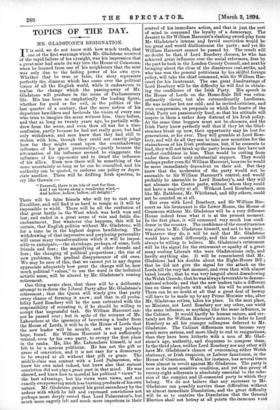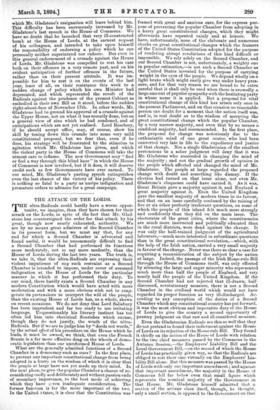TOPICS OF THE DAY.
MR GLADSTONE'S RESIGNATION.
IT is said, we do not know with how much truth, that one of the first warnings which Mr. Gladstone received of the rapid failure of his eyesight, was his impression that a great mist had made its way into the House of Commons, when he learned from one of his neighbours that the mist was only due to the failing power of his own eyes. Whether that be true or false, the story represents perfectly the dimness which has come over the political vision of all the English world, while it endeavours to realise the change which the passing-away of Mr. Gladstone will produce in the scene of Parliamentary life. His has been so emphatically the leading figure, whether for good or for evil, in the politics of the last quarter of a century, that the mere notion of his departure bewilders and beclouds the vision of every one who tries to imagine the scene without him.. Once before, and that as long as twenty years ago, he partially with- drew from the scene, and even then all was for a time confusion, partly because he had not really gone, but had only withdrawn, and men knew that they had still to reckon with him, though they could not exactly judge how far they might count upon the overshadowing influence of his great personality,—partly because the attenuation of his influence seemed to exaggerate the influence of his opponents and to dwarf the influence of his allies. Even now there will be something of the same uncertainty so long as he can be consulted, and his authority can be quoted, to endorse one policy or depre- ciate another. There will be drifting Irish spectres, to cry like Gawain Farewell, there is an isle of rest for thee. And I am blown along a wandering wind,—
And hollow, hollow, hollow, all delight !"
There will be false friends who will try to cast away Excalibur, and will find it as hard to resign as it will be impossible to wield. There will be all the confusion of that great battle in the West which was both won and lost, and ended in a great scene of vain and futile dis- enchantment. But whatever else happens, this will be certain, that English politics without Mr. Gladstone, will for a time be in the highest degree bewildering. The withdrawing of that impressive and perplexing personality will cause many transformations which it will be impos- sible to anticipate,—the shrinkage, perhaps, of some, both friends and foes ; the magnifying of other friends and foes ; the changing of political proportions ; the rise of new problems, the gradual disappearance of old ones. We may be sure of this, that we cannot yet in any degree appreciate adequately bow great the change will be, how much political "values," to use the word in the technical artistic sense, will be altered by Mr. Gladstone's coming retirement.
One thing seems clear, that there will be a deliberate attempt to re-form the Liberal Party after Mr. Gladstone's retirement ; that the Queen will wisely give that party every chance of forming it anew ; and that in all proba- bility Lord Rosebery will be the man entrusted with the responsibility of recasting it, if he should be willing to accept that ungrateful task. Sir William Harcourt can- not be passed over; but in spite of the screams of Mr. Labouchere at the ignominy of borrowing a leader from the House of Lords, it will be in the House of Lords that the new leader will be sought, and, we may perhaps hope, found. Sir William Harcourt is not sufficiently trusted, even by his own party, to occupy the first place in the ranks. He, like Mr. Labouchere himself, is not felt to be a serious politician. He has not the gift or .grace of conviction, and it is not easy for a democracy to be swayed at all without that gift or grace. The middle-class was content with a Lord Palmerston, who knew his own mind indeed, but knew also that earnest conviction did not play a great part in that mind. He was shrewd, and knew how to marshal his political " views " to the best advantage, but his views were views, and not exactly overpowering much less burning products of his own nature. Mr. Gladstone gained his great ascendency by the ardour with which he felt and expressed convictions not perhaps more deeply rooted than Lord Palmerston's, but much more eagerly felt and much more imperious in their control of his immediate action, and that is just the sort of mind to command the loyalty of a democracy. The descent to Sir William Harcourt's slashing sword-play from Mr. Gladstone's intense anil fervid conviction would be too great and would disillumonise the party; and yet Sir William Harcourt cannot be passed by. The result will no doubt be that, if Lord Rosebery chooses, he who has achieved great influence over the social reformers, first by the part he took in the London County Council, and next by bringing about the close of the disastrous coal-strike, and who has won the general politicians by his skilful foreign policy, will take the chief command, with Sir William Har- court for his lieutenant. The one great disadvantage of Lord Rosebery will be the difficulty he will find in obtain- ing the confidence of the Irish Party. His speech in the House of Lords on the Home-Rule Bill was extra- ordinarily clever, but also extraordinarily Laodicean.
He was neither hot nor cold; and he invited criticism, and even compromise, on proposals on which the hearts of the Irish Party are passionately fixed, so that his attitude will inspire in them a rather deep distrust of his Irish policy. At the same time beggars must not be choosers, and the Irish Party know perfectly well that if they let the Glad- stonians break up now, their opportunity may be lost for generations, or for ever. They will grumble at Lord Rose- bery, and will do all they can to take new securities for the staunchness of his Irish professions, but, if he consents to lead, they will not break up the party because they have not perfect confidence in him. That would be cutting from under them their only substantial support. They would perhaps prefer even Sir William Harcourt, because he would be more immediately dependent on their aid. But they know that the moderates of the party would not be amenable to Sir William Harcourt's control, and would probably be amenable to Lord Rosebery's, and they will not alienate the Centre party, without whom they could not have a majority at all. Without Lord Rosebery, men like Mr. Rathbone, Mr. Whitbread, and fifty others, could not be counted on at all.
But even with Lord Rosebery, and Sir William Har- court as his lieutenant in the Lower House, the House of Commons without Mr. Gladstone will be a very different House indeed from what it is at the present moment. In the first place, it will command very much less confi- dence in the country. The confidence of the constituencies was given to Mr. Gladstone himself, and not to his party. Whatever they do, it will be said that Mr. Gladstone would have acted differently, and this the country will always be willing to believe. Mr. Gladstone's retirement will be the signal for the retirement or apathy of a great many cooling Liberals who were Gladstonians only, and hardly anything else. It will be remembered that Mr. Gladstone had his doubts about the Eight-Hours Bill ; that he did not give the signal for the attack on the Lords till the very last moment, and even then with almost bated breath ; that he was very languid about disendowing the Welsh Church; that he was always favourable to denomi- national schools ; and that the new leaders take a different line on these subjects with which his will be contrasted. There can be no doubt at all that a great deal of leeway will have to be made up by any Prime Minister who, after Mr. Gladstone retires, takes his place. In the next place, no Minister, not Lord Rosebery nor any other, can wield the same influence, or anything like the same influence, in the Cabinet. It would hardly be human nature, and cer- tainly not Sir William Harcourt's nature, to defer to Lord Rosebery as all his younger colleagues deferred to Mr. Gladstone. The Cabinet differences must become very much more serious, and more likely to end in resignations, than they have been hitherto with a man of Mr. Glad- stone's age, authority, and eloquence to compose them. In the third place, neither Lord Rosebery nor any other will have Mr. Gladstone's chance of overcoming either Welsh obstinacy, or Irish suspicion, or Labour fanaticism, in the House of Commons. Wales, for instance, has several times been almost in revolt against Mr. Gladstone. The party is now in its most sensitive condition, and yet this group of twenty-eight adherents is absolutely essential to the cohe- sion of the complex and ill-cemented party to which they belong. We do not believe that any successor to Mr. Gladstone can possibly survive these difficulties without an almost immediate Dissolution, and the great difficulty will be so to contrive the Dissolution that the General Election shall not betray at all points the immense void which Mr. Gladstone's resignation will leave behind him. This difficulty has been enormously increased by Mr. Gladstone's last speech in the House of Commons. We have no doubt that he launched that very ill-constructed bomb at the House of Lords, at the earnest request of his colleagues, and intended to take upon himself the responsibility of endorsing a policy which he can personally neither superintend nor enforce. But even in this general endorsement of a crusade against the House of Lords, Mr. Gladstone was compelled to rest his case both on their offences in a very remote past, and on his evident anticipation of further offences in the future, rather than on their present attitude. It was im- possible for him to rest it on the events of the last year, least of all, on their resistance this week to a sudden change of policy which his own Minister had deprecated, and which represented the revolt of the Radicals against the prudence of the present Cabinet as embodied in their own Bill as it stood, before the sudden right-about-face of November 17th. In other words, Mr. Gladstone had to ground his approval of a crusade against the Upper House, not on what it has recently done, but on a general view of sins which he had condoned, and of anticipations which are not yet realised. Lord Rosebery, if he should accept office, may, of course, show his skill by toning down this erusade into some very mild constitutional proposal, but we fear that, even if he does, his strategy will be frustrated by the stimulus to agitation which Mr. Gladstone has given, and which the violent party in the House of Commons will take the utmost care to inflame. The new Government may "find or feel a way through this blind haze" in which the House of Commons is now involved, but if it does, it will deserve credit such as few Governments have ever earned. To our mind, Mr. Gladstone's parting speech extinguishes even the last chance of the victory of his policy. There is nothing so fatal to a party as unripe indignation and premature orders to advance for a great campaign.







































 Previous page
Previous page